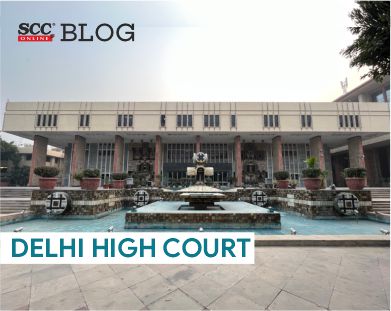Delhi High Court: The Single Judge Bench of Yashwant Varma, J. dismissed a petition on the ground of non-maintainability and held that a challenge to the mandate of the arbitrator on the ground of bias and a justifiable doubt with respect to the independence and impartiality cannot be raised under Section 14 of the Act.
Background
In the present case, the arbitration proceedings emanate from a Production Sharing Contract executed between the petitioner and respondent and was related to the development, production, and marketing of gas. The allegation in the present case was that the various procedural orders passed by the Arbitral Tribunal and the way proceedings had been conducted lead the petitioner to apprehend an evident bias and harboring justifiable doubts as to the independence and impartiality of the arbitrators.
Submissions on behalf of the Petitioner
The petitioner alleged that the procedural orders passed by the Arbitral Tribunal indicated that the Tribunal had treated them unfairly, denied them reasonable opportunity and favoured the cause of the respondents. The counsel for the petitioner submitted that an allegation of bias or where justifiable doubts were raised with respect to the independence or impartiality of an Arbitrator would necessarily fall within the ambit of a de jure disqualification which was contemplated under Section 14 of the Act. Further, it was submitted that once an allegation of bias or justifiable doubt was raised, it would be inequitable for a party to seek a ruling in that respect from the very members of the Arbitral Tribunal against whom such allegations had been levelled.
Submissions on behalf of the Respondents
The counsel for the respondents submitted that in terms of Section 12 of the Act, an arbitrator was obliged to make a disclosure with respect to the existence of any relationship or interests that he had with any of the parties or in relation to the subject matter of the dispute and which was likely to give rise to justifiable doubts as to their independence or impartiality. Further, it was submitted that the challenge to the orders of the Arbitral Tribunal in the present case were raised on the ground of bias and a justifiable doubt with respect to the independence and impartiality of the arbitrators, therefore, it was the procedure specified in Section 13 of the Act alone which could have been pursued. Thus, the instant petition which seeks to invoke the powers of this Court conferred by Section 14 of the Act was not maintainable.
Analysis, Law, and Decision
The Court opined that “while Sections 12, 13, and 14 of the Act may be recognized as constituting a composite statutory scheme dealing with the subject of challenge to an arbitrator and termination of mandate, they clearly constructed separate causeways for a challenge that may be laid. While Sections 12 and 13 lay down the procedure for challenges which must mandatorily be mounted before the Arbitral Tribunal, Section 14 spoke of challenges that may be instituted before a court as defined under the Act”.
The Court further opined that the disqualifications in the Seventh Schedule alone could be recognized as the de jure disqualifications under the Act. It would, therefore, include disqualifications which would automatically render an arbitrator ineligible to be either appointed or to continue. Thus, these disqualifications would inevitably result in the termination of the mandate. Moreover, the allegation of bias would fall outside the scope of de jure disqualification. Further, the Court stated that “the view taken by the Court stands fortified from a reading of Section 12(3) of the Act which mandated a party establishing that ‘circumstances exist’ giving rise to a justifiable doubt with respect to the independence or impartiality of an arbitrator”.
The Court for the following reasons found itself unable to countenance the submission that a bias allegation would fall within the ambit of Section 14 of the Act:
- The subject of bias and justifiable doubt was specifically dealt with in Section 12 of the Act and if the Court were to accord an interpretation upon Sections 12 and 14 and treat such an allegation as falling within an overlap of these provisions, it would not only be contrary to well settled rules of interpretation but would also clearly violate the evident scheme and intent of the Legislature.
- The expression de jure as occurring in Section 14 of the Act had to be construed as conditions recognized and ordained by law. The subject of bias and justifiable doubts was clearly provisioned in Section 12.
-
The right to challenge a ruling by the Arbitral Tribunal on justifiable doubt stands statutorily deferred till the award was rendered. Thus, it would be impermissible for this Court to either create or countenance such a right by interpreting Section 14 in the manner suggested by the petitioner.
The Court held that the members of the Tribunal appeared to have acted in accord with the challenge procedure which was laid down in Sections 12 and 13 of the Act. Therefore, the preliminary objection was upheld by this Court, and it was also added that the present order would not preclude the government from pursuing its application preferred before the Arbitral Tribunal. Thus, the petition was dismissed as being non-maintainable.
[Union of India v. Reliance Industries Limited, 2022 SCC OnLine Del 4310, decided on 9-12-2022]
Advocates who appeared in this case :
For the Petitioner: Senior Advocate A. K. Ganguli;
Advocate Shailendra Swarup;
Advocate Bindu Saxena;
Advocate Kirit Javali;
Advocate Mamta Tiwari ;
Advocate Arunav Ganguli;
Advocate Charu Ambwani;
For the Respondent(s): Senior Advocate Harish N. Salve;
Advocate Sameer Parekh;
Advocate Shonali Basu;
Advocate Ishan Nagar;
Advocate Prateek Khandelwal;
Advocate Abhishek Thakral;
Advocate Chetna Rai;
Advocate K. R. Sasiprabhu;
Advocate Mahesh Agarwal;
Advocate Rishi Agrawala;
Advocate Niyati Kohli;
Advocate Pranjit Bhattacharya;
Advocate Pratham Vir Agarwal.







